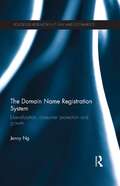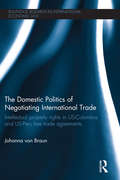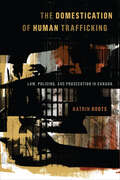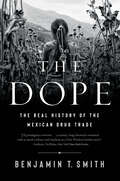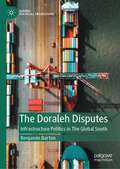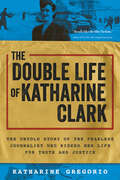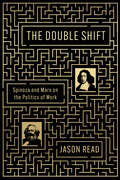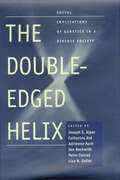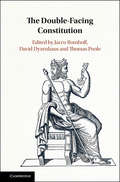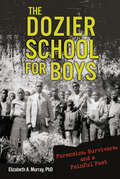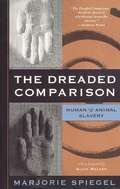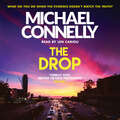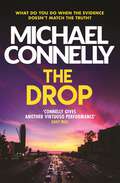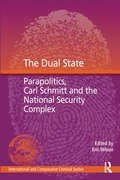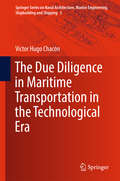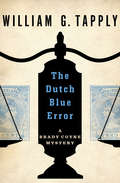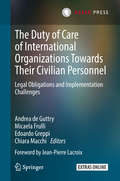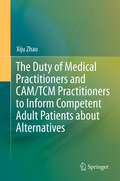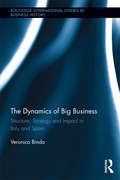- Table View
- List View
The Dogs of Avalon: The Race to Save Animals in Peril
by Laura SchenoneAfter adopting an Irish sight hound, Laura Schenone discovers a remarkable and little-known fight to gain justice for dogs and for all animals. Greyhounds, bred to be the fastest racing dogs on earth, are streaks of lightning. Beautiful, astonishing creatures, countless numbers of them disappear each year once they can no longer compete and win. The Dogs of Avalon introduces us to the strong-willed Marion Fitzgibbon, born in rural Ireland, where animals are valued only for their utility. But Fitzgibbon believes that suffering is felt by all creatures, and she champions the cause of strays, baffling those around her—including her family—as she and a group of local women rescue any animal in need and taking on increasingly risky missions. When Fitzgibbon becomes head of the Irish Society for the Prevention of Cruelty to Animals and focuses on the cause of the greyhound, she faces an entrenched racing industry protected by money and power. She joins forces with an American greyhound activist, a foxhunter’s wife, a British lady, and an influential German animal rescuer to create an international network to find these animals homes, confront the racing industry, and provide safe havens where animals can live in peace. The Dogs of Avalon brings forward the people on the other side of the tracks—Irish Travellers (a people whose Celtic history goes back centuries), dogmen who hope to win big—together with a host of animals on two continents—circus tigers in Ireland, wild monkeys in the Yucatan, dolphins in a marine animal park in Florida, and one very special Irish sight hound in New Jersey named Lily. In this potent David and Goliath story, Schenone’s journey helps us understand our deep connection to animals and gives us inspiration in the form of the unforgettable Fitzgibbon, who grapples with compassion and activism and shows the difference we are all capable of making in the world.
The Domain Name Registration System: Liberalisation, Consumer Protection and Growth (Routledge Research in Information Technology and E-Commerce Law)
by Jenny NgThis book offers a comparative analysis of the domain name registration systems utililsed in Australia and the United Kingdom. Taking an international perspective, the author analyses the global trends and dynamics of the domain name registration systems and explores the advantages and disadvantages of restrictive and less restrictive systems by addressing issues of consumer protection. The book examines the regulatory frameworks in the restrictive and unrestrictive registration systems and considers recent developments in this area. Jenny Ng also examines the legal and economic implications of these regulatory frameworks, drawing upon economic theory, regulatory and systems theory as well as applying rigorous legal analysis. In doing so, this work proposes ways in which such systems could be better designed to reflect the needs of the specific circumstances in individual jurisdictions. The Domain Name Registration System will be of particular interest to academics and students of IT law and e-commerce.
The Domestic Politics of Negotiating International Trade: Intellectual Property Rights in US-Colombia and US-Peru Free Trade Agreements (Routledge Research in International Economic Law)
by Johanna von BraunThe Domestic Politics of International Trade considers the issues surrounding intellectual property rights in international trade negotiations in order to examine the challenges posed to domestic policy-makers by the increasingly broad nature of Free Trade Agreements (FTAs). Throughout the book the author demonstrates the importance of domestic politics in understanding the nature and outcome of international negotiations, particularly as they relate to international economic diplomacy. The book looks in detail at the intellectual property negotiations which formed part of the US-Peru and US-Colombia Free Trade Agreements and analyses the extent to which public health authorities and other parties affected by the increased levels of intellectual property protection were integrated into the negotiation process. The book then juxtaposes these findings with an analysis of the domestic origins of US negotiation objectives in the field of intellectual property, paying particular attention to the role of the private sector in the development of these objectives. Based on a substantial amount of empirical research, including approximately 100 interviews with negotiators, capital based policy-makers, private sector representatives, and civil society organisations in Lima, Bogotá and Washington, DC, this book offers a rare account of different stakeholders’ perceptions of the FTA negotiation process. Ultimately, the book succeeds in integrating the study of domestic politics with that of international negotiations. This book will be of particular interest to academics as well as practitioners and students in the fields of international law, economic law, intellectual property, political economy, international relations, comparative politics and government.
The Domestication of Human Trafficking: Law, Policing, and Prosecution in Canada
by Katrin RootsHuman trafficking has emerged as one of the top international and domestic policy concerns, and is well covered and often sensationalized by the media. The nature of the topic combined with various international pressures has resulted in an array of government-led mandates to combat the issue. The Domestication of Human Trafficking examines Canada’s criminal justice approaches to human trafficking, with a particular focus on the ways in which the intersecting factors of race, class, gender, and sexuality impact practice. Using a wide range of qualitative and empirically grounded research methods, including extensive analysis of court documents, trial transcripts, and interviews with criminal justice actors, this book contributes to much-needed research that examines, specifies, and sometimes complicates the narratives of how trafficking works as a criminal offence. The Domestication of Human Trafficking turns our attention to the ways in which the offence of human trafficking is made on the front lines of criminal justice efforts in Canada.
The Domino Killer
by Neil WhiteWhen a man is found beaten to death in a local Manchester park, Detective Constable Sam Parker is one of the investigating officers. Sam swiftly identifies the victim, but what at first looks like an open and shut case quickly starts to unravel when he realises that the victim's fingerprints were found on a knife at another crime scene, a month earlier.Meanwhile, Sam's brother, Joe - a criminal defence lawyer in the city - comes face to face with a man whose very presence sends shockwaves through his life. Joe must confront the demons of his past as he struggles to come to terms with the darkness that this man represents.Before long, Joe and Sam are in way over their heads, both sucked into a terrifying game of cat-and-mouse that threatens to change their lives for ever...'Authenticity reeks from every page...hypnotic, troubling crime writing with a superb villain and a distinctive atmosphere.' Daily Mail on Next to Die
The Domino Killer
by Neil WhiteWhen a man is found beaten to death in a local Manchester park, Detective Constable Sam Parker is one of the investigating officers. Sam swiftly identifies the victim, but what at first looks like an open and shut case quickly starts to unravel when he realises that the victim's fingerprints were found on a knife at another crime scene, a month earlier.Meanwhile, Sam's brother, Joe - a criminal defence lawyer in the city - comes face to face with a man whose very presence sends shockwaves through his life. Joe must confront the demons of his past as he struggles to come to terms with the darkness that this man represents.Before long, Joe and Sam are in way over their heads, both sucked into a terrifying game of cat-and-mouse that threatens to change their lives for ever...'Authenticity reeks from every page...hypnotic, troubling crime writing with a superb villain and a distinctive atmosphere.' Daily Mail on Next to Die
The Dope: The Real History Of The Mexican Drug Trade
by Benjamin T. SmithA myth-busting, 100-year history of the Mexican drug trade that reveals how an industry founded by farmers and village healers became dominated by cartels and kingpins. The Mexican drug trade has inspired prejudiced narratives of a war between north and south, white and brown; between noble cops and vicious kingpins, corrupt politicians and powerful cartels. In this first comprehensive history of the trade, historian Benjamin T. Smith tells the real story of how and why this one-peaceful industry turned violent. He uncovers its origins and explains how this illicit business essentially built modern Mexico, affecting everything from agriculture to medicine to economics—and the country’s all-important relationship with the United States. Drawing on unprecedented archival research; leaked DEA, Mexican law enforcement, and cartel documents; and dozens of harrowing interviews, Smith tells a thrilling story brimming with vivid characters—from Ignacia “La Nacha” Jasso, “queen pin” of Ciudad Juárez, to Dr. Leopoldo Salazar Viniegra, the crusading physician who argued that marijuana was harmless and tried to decriminalize morphine, to Harry Anslinger, the Machiavellian founder of the American Federal Bureau of Narcotics, who drummed up racist drug panics to increase his budget. Smith also profiles everyday agricultural workers, whose stories reveal both the economic benefits and the human cost of the trade. The Dope contains many surprising conclusions about drug use and the failure of drug enforcement, all backed by new research and data. Smith explains the complicated dynamics that drive the current drug war violence, probes the U.S.-backed policies that have inflamed the carnage, and explores corruption on both sides of the border. A dark morality tale about the American hunger for intoxication and the necessities of human survival, The Dope is essential for understanding the violence in the drug war and how decades-old myths shape Mexico in the American imagination today.
The Doraleh Disputes: Infrastructure Politics in The Global South (Global Political Transitions)
by Benjamin BartonThis book focuses on underexploited data drawn from various legal disputes over the Doraleh Container Terminal in order to paint a portrait of SSC when it comes to infrastructure financing and construction in Africa as provided both by the UAE and China. By producing a detailed account of the drivers behind these disputes as well as the broader political outcomes they have generated, this study provides invaluable conceptual and empirical lessons on the contemporary meaning of SSC. In doing so, it helps readers garner a more acute understanding of the role played by Global South states and the private sector (SOEs) against the backdrop of SSC.
The Double Edged Helix: Social Implications of Genetics in a Diverse Society
by Adrienne Asch Jon Beckwith Peter Conrad Lisa N. Geller Joseph Alper Catherine ArdThe authors address the medical and ethical implications of the new technologies, outlining potential positive and negative effects of genetic research on minorities, people with disabilities, and those of diverse sexual orientations. Presenting a wide array of perspectives, this book emphasizes the need to ensure that research into genetics does not result in discrimination against people on the basis of their DNA.
The Double Life of Katharine Clark: The Untold Story of the Fearless Journalist Who Risked Her Life for Truth and Justice
by Katharine Gregorio"Gregorio tells [Katharine] Clark's story in engaging, well-researched and vivid detail...an eloquent tribute." —Wall Street JournalIf you loved Kate Moore's The Radium Girls, Sonia Purnell's A Woman of No Importance, or Rebecca Donner's All the Frequent Troubles of Our Days, you'll be enthralled with this untold true story of how Katharine Clark, a trailblazing journalist, exposed the truth about Communism to the world.In 1955, Katharine Clark, the first American woman wire reporter behind the Iron Curtain, saw something none of her male colleagues did. What followed became one of the most unusual adventure stories of the Cold War. While on assignment in Belgrade, Yugoslavia, Clark befriended a man who, by many definitions, was her enemy. But she saw something in Milovan Djilas, a high-ranking Communist leader who dared to question the ideology he helped establish, that made her want to work with him. It became the assignment of her life.Against the backdrop of protests in Poland and a revolution in Hungary, she risked her life to ensure Djilas's work made it past the watchful eye of the Yugoslavian secret police to the West. She single-handedly was responsible for smuggling his scathing anti-Communism manifesto, The New Class, out of Yugoslavia and into the hands of American publishers. The New Class would go on to sell three million copies worldwide, become a New York Times bestseller, be translated into over 60 languages, and be used by the CIA in its covert book program.Meticulously researched and written by Clark's great-niece, Katharine Gregorio, The Double Life of Katharine Clark illuminates a largely untold chapter of the twentieth century. It shows how a strong-willed, fiercely independent woman with an ardent commitment to truth, justice and freedom put her life on the line to share ideas with the world, ultimately transforming both herself—and history—in the process.Praise for The Double Life of Katharine Clark:"Reads like thriller fiction."—Major General Mari K. Eder, author of The Girls Who Stepped Out of Line"[A] nail-biting story…recreates a forgotten chapter of the Cold War."—Robert D. Kaplan, national bestselling author of Balkan Ghosts"An interesting read well told."—Nina Willner, author of Forty Autumns"[A] fascinating book about an extraordinary woman who made her mark during the Cold War."—Dr. Aleksa Djilas, author of The Contested Country and the son of Steffie and Milovan Djilas
The Double Shift: Spinoza and Marx on the Politics of Work
by Jason Read"This book is a must read for students of contemporary capitalism."—Kathi Weeks, Duke University"Why do people fight for their exploitation as if it was liberation?" How Marx and Spinoza can explain our perverse attachment to the indignities of workIn a world of declining wages, working conditions, and instability, the response for many has been to work harder, increasing hours and finding various ways to hustle in a gig economy. What drives our attachment to work? To paraphrase a question from Spinoza, "Why do people fight for their exploitation as if it was liberation?"The Double Shift turns towards the intersection of Marx and Spinoza in order to examine the nature of our affective, ideological, and strategic attachment to work. Through an examination of contemporary capitalism and popular culture it argues that the current moment can be defined as one of "negative solidarity."The hardship and difficulty of work is seen not as the basis for alienation and calls for its transformation but rather an identification with the difficulties and hardships of work. This distortion of the work ethic leads to a celebration of capitalists as job creators and suspicion towards anyone who is not seen as a "real worker."The book is grounded in philosophy, specifically Marx and Spinoza, and is in dialogue with Plato, Smith, Hegel, and Arendt, but, at the same time, in examining contemporary ideologies and ideas about work it discusses motivational meetings at Apple Stores, the culture of Silicon Valley, and films and television from Office Space to Better Call SaulThe Double Shift argues for a transformation of our collective imagination and attachment to work.
The Double-Edged Helix: Social Implications of Genetics in a Diverse Society
by Joseph S. Alper, Catherine Ard, Adrienne Asch, Jon Beckwith, Peter Conrad, and Lisa N. GellerThis bioethics anthology exploring the questions and controversies surrounding the innovations of 21st century genetics.When the Human Genome Project completed its work in the early 2000s, it was hailed as a watershed moment in the history of medicine. But not everyone felt the same optimism about where the breakthrough might lead. The Double-Edged Helix explores the impact of recent genetic discoveries on society as a whole as well as individual populations and communities. This volume outlines potential positive and negative effects of genetic research on minorities, individuals with disabilities, and those of diverse sexual orientations. Presenting a wide array of perspectives, contributors address the medical and ethical implications of newly available technologies, from prenatal genetic screenings to the so-called “gay gene” debates. They emphasize the need to ensure that genetics research does not lead to discrimination against people on the basis of their DNA.A Choice Magazine Outstanding Academic Title
The Double-Edged Helix: Social Implications of Genetics in a Diverse Society (Bioethics)
by Joseph S. Alper, Catherine Ard, Adrienne Asch, Jon Beckwith, Peter Conrad, and Lisa N. GellerSelected as an Outstanding Academic Title for 2003 from Choice MagazineThe Double-Edged Helix explores the impact of recent genetic discoveries on both different population segments and society as a whole. The authors address the medical and ethical implications of the new technologies, outlining potential positive and negative effects of genetic research on minorities, individuals with disabilities, and those of diverse sexual orientations. Presenting a wide array of perspectives, this book emphasizes the need to ensure that research into genetics research does not result in discrimination against people on the basis of their DNA.
The Double-Facing Constitution
by Jacco Bomhoff Thomas Poole David DyzenhausThis collection explores some of the many ways in which constitutional orders engage with, and are shaped by, their exteriors. Constitutional and legal theory often marginalize 'foreign' elements, such as norms originating in other legal systems, the movement of individuals across borders, or the application of domestic law to foreign affairs. In The Double-Facing Constitution, these instances of boundary crossing lie at the heart of an alternative understanding of constitutions as permeable membranes, through which norms can and sometimes must travel. Constitutional orders are facing both inwards and outwards - and the outside world influences their interiors just as much as their internal orders help shape their surroundings. Different essays discuss the theoretical and historical foundations of this view (grounded in Kelsen, Hobbes, Locke, Rousseau and others), and its contemporary relevance for areas as diverse as migration law, the conflict of laws, and foreign relations law.
The Dozier School for Boys: Forensics, Survivors, and a Painful Past
by Elizabeth A. MurraySome true crimes reveal themselves in bits and pieces over time. One such case is the Florida School for Boys, a.k.a. the Dozier School, a place where—rather than reforming the children in their care—school officials tortured, raped, and killed them. Opened in 1900, the school closed in 2011 after a Department of Justice investigation substantiated allegations of routine beatings and killings made by about 100 survivors. Thus far, forensic anthropologist Dr. Erin Kimmerle and her team from the University of South Florida have uncovered fifty-five sets of human remains. Follow this story of institutional abuse, the brave survivors who spoke their truth, and the scientists and others who brought it to light.
The Dreaded Comparison: Human And Animal Slavery
by Alice Walker Marjorie SpiegelConsidered a seminal book in the fields of Bioethics and Human-Animal Studies, and a classic in the field of humane thought, Marjorie Spiegel's The Dreaded Comparison makes a significant contribution to our efforts to understand the roots of individual and societal violence, tying current cultural practices to the legacy of human bondage, and introducing new and diverse audiences to the history of slavery and institutionalized racism in the United States. Spanning history, psychology, and current events-- and ground-breaking for its thesis which presents the first in-depth exploration of the similarities between the violence humans have wrought against other humans, and our culture's treatment of non-human animals-- The Dreaded Comparison has contributed to subsequent explorations by other scholars, historians, legal scholars, law professors and educators in diverse fields to view and further define the modern system of animal exploitation in terms of the model and legacy of human slavery. The Dreaded Comparison also contributed substantially to broadening the philosophical foundation of the modern discourse about animals beyond its traditionally more limited scope, instilling a far more inclusive and historically-grounded understanding of the critical issues Spiegel sensitively explores in this book.
The Drop (Harry Bosch Series #15)
by Michael ConnellyWhen evidence links a brutal murder in 1989 to a convicted rapist named Clayton Pell, the case should be water-tight. Pell's DNA was found on the victim - but he was only eight years old at the time. This is not the only mystery Harry Bosch has to solve. A man jumped - or was pushed - from a window. The victim's father is Councilman Irving, who's been intent on destroying Harry's career for years. Now Irving wants Harry to head up the investigation. Harry uncovers traces of two of the city's deepest secrets: a killer operating for as many as three decades without being detected, and a conspiracy that goes back into the dark history of the police department...Read by Len Cariou(p) 2011 Hachette Audio
The Drop (Harry Bosch Series #15)
by Michael ConnellyIs it the end of the line for Harry Bosch? When evidence links a brutal murder in 1989 to a convicted rapist named Clayton Pell, the case should be watertight. Pell's DNA was found on the victim - but he was only eight years old at the time. This is not the only mystery Harry Bosch has to solve. A man jumped - or was pushed - from a window. The victim's father is Councilman Irving, who's been intent on destroying Harry's career for years. Now Irving wants Harry to head up the investigation. Harry uncovers traces of two of the city's deepest secrets: a killer operating for as many as three decades without being detected, and a conspiracy that goes back into the dark history of the police department . . .
The Dual State: Parapolitics, Carl Schmitt and the National Security Complex (International and Comparative Criminal Justice)
by Eric WilsonThis volume presents a practical demonstration of the relevance of Carl Schmitt's thought to parapolitical studies, arguing that his constitutional theory is the one best suited to investing the ’deep state’ with intellectual and doctrinal coherence. Critiquing Schmitt’s work from a variety of intellectual perspectives, the chapters discuss current parapolitical reality within the domain of criminology, the parapolitical nature of both the dual state and the national security state corporate complex. Using the USA as a prime example of the world’s current dual or ’deep political state’, the criminogenic dimensions of the parapolitical systems of post 9/11 America are discussed. Using case studies, the dual state is examined as the causal factor of inexplicable parapolitical events within both the developed and developing world, including Sweden, Canada, Italy, Turkey, and Africa.
The Due Diligence in Maritime Transportation in the Technological Era
by Víctor Hugo ChacónThis book discusses the problem of sea carriers’ liability, with a particular focus on role of the technologies that have been employed to support maritime transport in recent decades. It examines the Hague Rules, providing an overview of the precedent standard of liability, its historical development up until its application, and its construction at the current time. To do so, it presents two exemplary studies from English and American case law, and analyzes the situations in which the courts have required the application of new technologies as part of the duties set in the current governing liability regime. Written in an easy-to-follow style, the book offers not only an unique overview of the applications of technologies in making ships both seaworthy and cargo-worthy, but also a practice-oriented guide to understanding and making decisions about sea carriers’ liability. It is intended for law practitioners as well as advanced graduate students and researchers in the field of maritime shipping, transport and insurance law
The Dutch Blue Error (The Brady Coyne Mysteries #2)
by William G. TapplyBoston lawyer Brady Coyne investigates a philatelist fatality in &“a first-rate mystery . . . a knockout climax, charged with irony&” (The Washington Post Book World). It is a small paper square with uneven edges, dark blue in color and bearing a smudged portrait of a long-dead king. It doesn&’t look like much to Brady Coyne, but the stamp known as the Dutch Blue Error is one of a kind—a philatelic freak worth at least one million dollars. It is the prize possession of Ollie Weston, a wheelchair-bound Boston banker, and it is valuable enough that for its sake, several good men will die. A fellow collector contacts Weston, claiming to have found a second copy of the Error—a claim that, if truthful, would destroy the stamp&’s value. Weston sends his attorney, kindhearted Boston lawyer Brady Coyne, to purchase the rogue stamp for two hundred fifty thousand dollars, but just before the hand-off, the collector is killed and the stamp disappears. Find the stamp and Brady will find the killer—but that will involve risking another one-of-a-kind item: his life.
The Duty of Care of International Organizations Towards Their Civilian Personnel: Legal Obligations and Implementation Challenges
by Andrea De Guttry Micaela Frulli Edoardo Greppi Chiara MacchiThis book constitutes the first comprehensive publication on the duty of care of internationalorganizations towards their civilian personnel sent on missions and assignments outsideof their normal place of activity. While the work of the civilian personnel of internationalorganizations often carries an inherent risk, the regulations, policies and practices of theemployer can help to address and mitigate that risk.In this book, the specific content and scope of the duty of care under international law is clarifiedby conducting an unprecedented investigation into relevant jurisprudence and legal sources.Included is a critical assessment of the policies of selected international organizations while aset of guiding principles on the duty of care of international organizations is also presented.This publication fills a gap in the existing academic literature on the topic and is aimedparticularly at academics and practitioners interested in the legal implications of the deploymentof civilian personnel abroad by international organizations. This includes scholarsand university-level students specializing in international law, international human rightslaw, the law of international organizations, labour law, EU law, international administrativelaw and the UN system, and practitioners, such as lawyers and consultants, representing oradvising international organizations or their personnel on the legal aspects of deployment.The book is also aimed at the senior management of international organizations and at theirofficers in charge of recruitment, human resources, training and security, in that it clarifiestheir legal obligations and provides concrete examples of the policies various internationalorganizations have in place for the protection of civilian personnel. Current and prospectivecivilian personnel of international organizations should also find the book useful forclarifying their rights and duties.Andrea de Guttry is Full Professor at the Dirpolis Institute of the Sant’Anna School ofAdvanced Studies in Pisa, Micaela Frulli is Associate Professor at the Dipartimento di ScienzeGiuridiche (DSG), University of Florence, Edoardo Greppi is Full Professor at the Dipartimentodi Giurisprudenza, University of Turin, and Chiara Macchi is Research Fellow at theDirpolis Institute of the Sant’Anna School of Advanced Studies in Pisa.
The Duty of Medical Practitioners and CAM/TCM Practitioners to Inform Competent Adult Patients about Alternatives
by Xiju ZhaoThe book pays interest to a small and almost untouched topic: a health practitioner' s duty to inform about alternatives. It covers both orthodox medicine practitioners and CAM practitioners. The topic is explored in a co mparative way, examining the laws of not only common law jurisdictions, such as the USA, England, Canada, Australia, New Zealand, but also two East Asia jurisdictions ( China and Japan ) . It uses the collective wisdom of several common law jurisdictions, but also differentiates them. It places the issue of "disclosure of alternatives" in a clear and wider context, making a cogent distinction between diagnosis/treatment and information disclosure.
The Dynamic Constitution: An Introduction to American Constitutional Law
by Richard H. Fallon Jr.The US Constitution is by no means just a fragile nut-brown document left in a nice glass case at the end of some corridor. Fallon (constitutional law, Harvard Law School) focuses on the social impact of the Constitution, and he begins with its original design and describes the theories and processes of judicial review. He examines civil rights including freedom of speech and association, freedom of religion, protection of economic liberties, equal protection, and fundamental rights. He analyzes the separation of powers, elections and political democracy, limits on state power and resulting individual rights, war and emergency, the reach of the Constitution and the enforcement power of Congress. After his very interesting conclusion about the future of constitutional law, he takes that fragile document out of its case and prints it as an appendix, for those amongst us who have misplaced it somewhere. Annotation ©2004 Book News, Inc. , Portland, OR (booknews. com)
The Dynamics of Big Business: Structure, Strategy, and Impact in Italy and Spain (Routledge International Studies in Business History #22)
by Veronica BindaThroughout the Twentieth Century, big business has been a basic institution. Large corporations have provided a fundamental contribution to the wealth of nations and, at the same time, have had a remarkable impact on the political and social systems within which they have operated. It is difficult to understand the development of the most advanced economies if we do not consider the specific evolution of big business in every national case. On the other hand, it is not possible to explain the shape and behavior of big business without considering its development as part of the history of the country in which they operate. The largest US, German, British and French firms were key actors in favoring their nations' development and, even at the end of the Twentieth Century, made a very important contribution to their growth. In many countries, a stable core of large corporations developed only relatively lately, or did not develop at all, and under these circumstances, big business was not able to significantly participate in the economic growth of such countries. Scholars who dealt with the economic history of Italy and Spain are generally unanimous in tagging these nations as industrial late-comers, ineffective in promoting big autochthonous private and State-owned firms, dominated by family companies, and characterized by a strong competitive advantage on the part of small and medium-sized enterprises. At the same time, Spanish and Italian business and economic historians have tended to say little about the role and features of big business. This book thus fills a significant gap in the work on the development of Southern European capitalism and its large corporations by analyzing the Italian and Spanish cases and comparing them with each other and with what has occurred in the United States and in the largest European nations. Examining both the macro dynamics (national but also supra national) and the micro level, utilizing samples of big corporations and going deeply into some company cases, this volume identifies some important protagonists of the Italian and Spanish economies (such as the State, families and foreign investors) and investigates a wider panorama which includes the political, economic and social relationships of the corporations, providing insights into the form of capitalism that exists in these countries.

